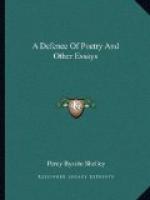Among the ancient Greeks the male sex, one half of the human race, received the highest cultivation and refinement: whilst the other, so far as intellect is concerned, were educated as slaves and were raised but few degrees in all that related to moral of intellectual excellence above the condition of savages. The gradations in the society of man present us with slow improvement in this respect. The Roman women held a higher consideration in society, and were esteemed almost as the equal partners with their husbands in the regulation of domestic economy and the education of their children. The practices and customs of modern Europe are essentially different from and incomparably less pernicious than either, however remote from what an enlightened mind cannot fail to desire as the future destiny of human beings.
[1818; publ. 1840]
ON THE SYMPOSIUM, OR PREFACE TO THE BANQUET OF PLATO
A FRAGMENT
The dialogue entitled The Banquet was selected by the translator as the most beautiful and perfect among all the works of Plato. [Footnote: The Republic, though replete with considerable errors of speculation, is, indeed, the greatest repository of important truths of all the works of Plato. This, perhaps, is because it is the longest. He first, and perhaps last, maintained that a state ought to be governed, not by the wealthiest, or the most ambitious, or the most cunning, but by the wisest; the method of selecting such rulers, and the laws by which such a selection is made, must correspond with and arise out of the moral freedom and refinement of the people.] He despairs of having communicated to the English language any portion of the surpassing graces of the composition, or having done more than present an imperfect shadow of the language and the sentiment of this astonishing production.




